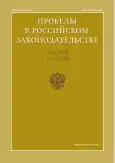Проблемы правового регулирования возбуждения уголовных дел о мошенничестве
- Авторы: Смолин А.Г.1, Шигуров А.В.1
-
Учреждения:
- Средне-Волжский институт (филиал) федерального государственного бюджетного образовательного учреждения высшего образования «Всероссийский государственный университет юстиции (РПА Минюста России)»
- Выпуск: Том 17, № 7 (2024)
- Страницы: 152-157
- Раздел: Уголовно-правовые науки
- URL: https://journal-vniispk.ru/2072-3164/article/view/284112
- DOI: https://doi.org/10.33693/2072-3164-2024-17-7-152-157
- EDN: https://elibrary.ru/FQFUFI
- ID: 284112
Цитировать
Аннотация
Цель исследования. Стремительный рост совершаемых мошенничеств в последние годы (26 % в 2023 г.) свидетельствует о необходимости совершенствования правовых основ деятельности органов предварительного расследования. В статье рассмотрен ряд актуальных проблем правового регулирования производства в стадии возбуждения уголовного дела. Выводы. Учитывая объективную необходимость легализации длительных сроков доследственной проверки по делам о мошенничестве, где более 30 % уголовных дел возбуждается с превышением установленного законом максимального срока, авторы предлагают разрешить прокурору или руководителю следственного органа субъекта РФ продлять проверку в стадии возбуждения дела на срок более 30 суток. В статье рассмотрена проблема производства в стадии возбуждения уголовного дела выемки, востребованной при проверке сообщений о мошенничествах. Отмечая дискуссионность данного вопроса, а также наличие противоречивой судебной практики, авторы предлагают, во-первых, уточнить формулировку ч. 1 ст. 144 УПК РФ, включив в число разрешенных следственных действий выемку, во-вторых, до изменений закона руководствоваться позицией Верховного Суд РФ, изложенной в постановлении от 25 августа 2017 г. № 16-УД17-16, где обоснована законность данного следственного действий. Также авторы обращают внимание на необходимость унификации полномочий дознавателя и следователя на получение справки по счетам и вкладам физических лиц, поскольку необходимость в оперативном получении информации о денежных переводах, поступлении денег потерпевших конкретным лицам существует не только при расследовании квалифицированных мошенничеств, но и в простых составах, которые относятся к подследственности органов дознания.
Ключевые слова
Полный текст
Открыть статью на сайте журналаОб авторах
Андрей Геннадьевич Смолин
Средне-Волжский институт (филиал) федерального государственного бюджетного образовательного учреждения высшего образования «Всероссийский государственный университет юстиции (РПА Минюста России)»
Автор, ответственный за переписку.
Email: smolag@mail.ru
SPIN-код: 4871-8256
кандидат юридических наук, доцент кафедры уголовного права и процесса
Россия, г. Саранск
Александр Викторович Шигуров
Средне-Волжский институт (филиал) федерального государственного бюджетного образовательного учреждения высшего образования «Всероссийский государственный университет юстиции (РПА Минюста России)»
Email: arshigurov@mail.ru
SPIN-код: 6769-0262
кандидат юридических наук, заведующий кафедрой уголовного права и процесса
Россия, г. СаранскСписок литературы
- Акиндеева А.В., Степанов Р.Г. Возбуждение уголовного дела по делам о мошенничестве с использованием платежных карт // Ленинградский юридический журнал. 2007. № 3 (9). С. 117–120.
- Апелляционное постановление Верховного суда Республики Крым от 18.01.2018 г. по делу № 22-3730/2017. Доступ из справочной правовой системы «Гарант».
- Бегишев И.Р. Некоторые вопросы противодействия мошенничеству в сфере компьютерной информации // Вестник Казанского юридического института МВД России. 2016. № 3 (25). С. 112–117.
- Богданов А.В., Ильинский И.И., Хазов Е.Н. Киберпреступность и дистанционное мошенничество как одна из угроз современному обществу // Криминологический журнал. 2020. № 1. С. 15–20.
- Васюков В.Ф. Мошенничество в сфере компьютерной информации: сложности квалификации // Уголовный процесс. 2017. № 3 (147). С. 50–57.
- Дамирчиев Э.И.О., Васюков В.Ф. Некоторые вопросы противодействия дистанционным мошенничествам в Китае // Научный вестник Орловского юридического института МВД России им. В.В. Лукьянова. 2024. № 2 (99). С. 161–166.
- Делль Д.А. Проблемы производства следственных действий до возбуждения уголовного дела: дис. … кандидат юридических наук. Екатеринбург, 2023. 234 с.
- Карагодин В.Н. Осмотр места происшествия, обыск или выемка? // Российский юридический журнал. 2012. № 5. С. 128–132.
- Каретников А.С., Каретников С.А. Следственные действия как способы проверки сообщения о преступлении // Законность. 2014. № 7. С. 37–42.
- Подольный Н.А. Некоторые особенности первоначального этапа расследования мошенничества на рынке ценных бумаг // Российский следователь. 2012. № 9. С. 8–9.
- Подольный Н.А. Особенности места совершения мошенничества на рынке ценных бумаг // Российский следователь. 2012. № 22. С. 2–3.
- Постановление Верховного Суда РФ от 25.08.2017 № 16-УД17-16. Доступ из справочной правовой системы «КонсультантПлюс».
- Селюжицкая Г.М. Методика расследования мошенничеств, совершенных в отношении лиц пожилого возраста: дис. … кандидат юридических наук. Москва, 2023. 239 с.
- Семенов Е.А., Шайдуллина Э.Д. Уголовно-процессуальный анализ проблем в доказывании современных мошенничеств, совершаемых по принципу «финансовых пирамид» // Научный вестник Орловского юридического института МВД России имени В.В. Лукьянова. 2019. № 2 (79). С. 78–81.
- Состояние преступности. URL: https://xn--b1aew.xn--p1ai/reports/1/ (дата обращения: 18.10.2024).
- Судницын А.Б. К вопросу о возможности производства выемки до возбуждения уголовного дела // Законодательство и практика. 2017. № 2. С. 29–32.
- Уголовно-процессуальные аспекты закона «О мошенничестве» // Вестник Удмуртского университета. Серия Экономика и право. 2013. № 2. С. 155–158.
- Уголовно-процессуальный кодекс Республики Беларусь от 16 июля 1999 г. № 295-З (с изменениями и дополнениями по состоянию на 08.01.2024 г.). URL: https://continent-online.com/Document/?doc_id=30414958#pos=1954;-1 (дата обращения: 18.10.2024).
- Уголовно-процессуальный кодекс Российской Федерации от 18.12.2001 № 174-ФЗ // Собрание законодательства РФ. 2001. № 52 (ч. I). Ст. 4921.
- Федерального закона от 2 декабря 1990 г. № 395-1 «О банках и банковской деятельности. Доступ из справочной правовой системы «КонсультантПлюс».
- Халиков А.Н. Собирание доказательств в ходе проверки сообщения о преступлении // Законность. 2013. № 12. С. 54–57.
Дополнительные файлы









